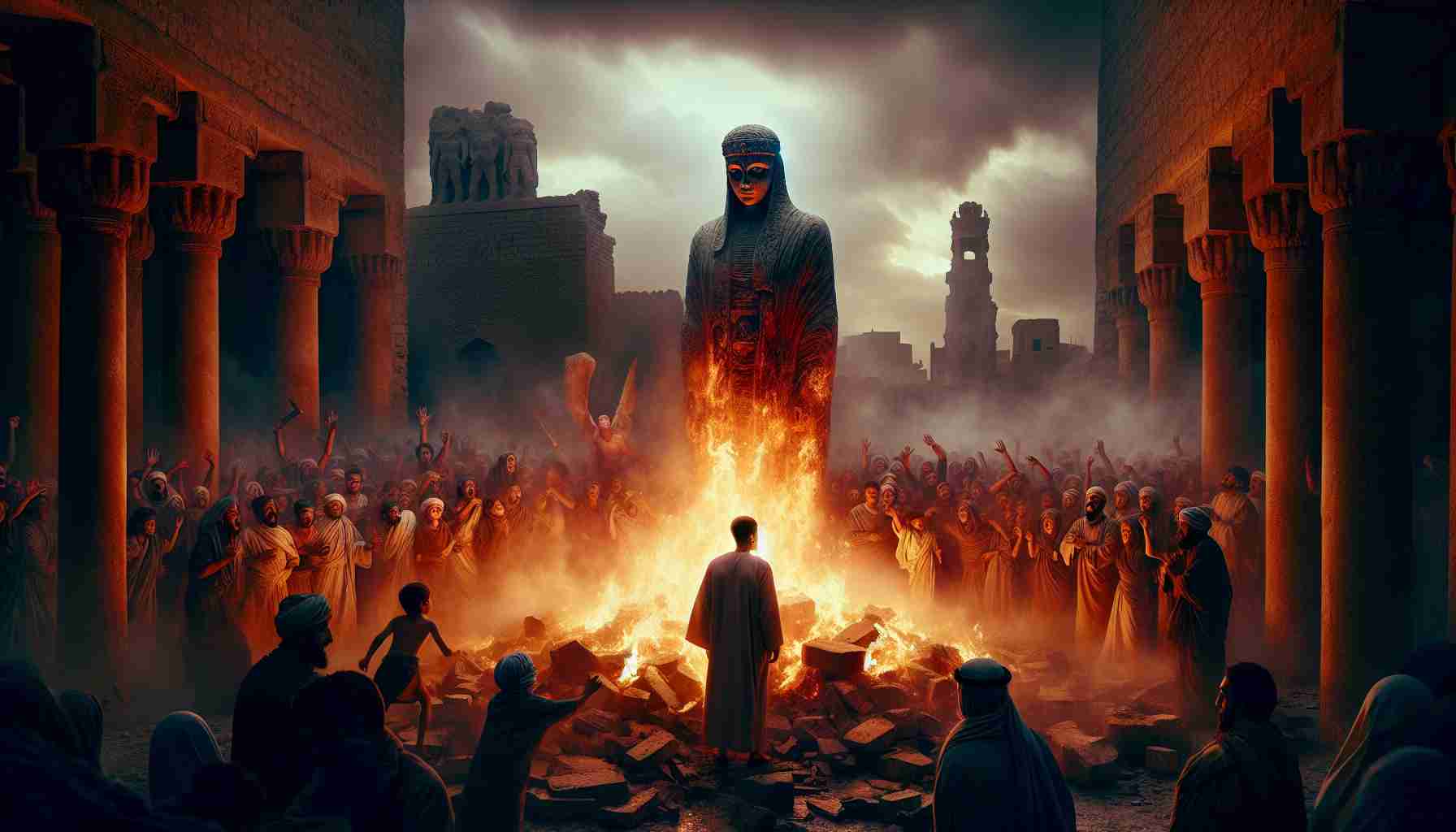

The dust was still warm from the afternoon sun as I crouched behind the old stone wall near the courtyard. I had followed him again—my uncle Ibrahim—though my parents told me not to. They said he spoke strange things, that he stirred unrest among the people. But whenever I was near him, his eyes held a calm that even the fiercest elders couldn’t extinguish.
I peeked over the wall and watched him walk into our town’s sacred hall where the idols stood—tall, colorful, carved with care and generations of devotion. My father had taken me there to pray many times, to ask favors of stone mouths that never answered. But Ibrahim… he stared at them not with reverence, but with sorrow. Like he pitied the stones others feared.
When he emerged later, the courtyard was silent—eerily so. People screamed, cried, pointed. The statues were ruined, shattered. All but one—the largest—was untouched but around its neck hung the very axe used to destroy them. My heart pounded. Ibrahim had done it… openly defied the gods, as if daring them to strike him down.
They dragged him through the streets. I followed in the crowd, neck craned, feet stumbling. “Burn him!” they shouted, and I trembled. This was no small fire—a pit was dug, wood piled higher than a man. Flames leapt into the sky. I watched as they tied him and stood him at the edge. His face—still and certain. Not a flicker of fear.
I wanted to look away, but I couldn’t.
Then they cast him in.
The fire roared. Women fainted. Men trembled in awe of their own wrath.
But nothing burned.
As the flames danced, they parted around him like wind through grass. His ropes were gone. He stood within the inferno, untouched and glowing—not with heat, but with light that felt like truth. Like everything the idols never gave.
For a long time, no one spoke.
When he finally stepped out, not a hair on his head singed, the silence broke with gasps. And within me, something crumbled and something else took root.
Later that night, I sat alone, far from the now-empty pedestal where an idol once stood. I understood then what Ibrahim had shown us—not about fire or stone, but about truth. The idols were never gods. They were echoes of fear, shaped by hands that forgot where they once reached.
And Ibrahim… he stood not against stone, but against illusion. The fire didn’t destroy him—it revealed him.
Since that day, I no longer feared what others worshipped. I feared a life spent in ignorance more. Faith, I learned, is not in what we see, but in the truth we’re willing to stand within—even if it feels like fire.
And in that fire, I found belief.
The dust was still warm from the afternoon sun as I crouched behind the old stone wall near the courtyard. I had followed him again—my uncle Ibrahim—though my parents told me not to. They said he spoke strange things, that he stirred unrest among the people. But whenever I was near him, his eyes held a calm that even the fiercest elders couldn’t extinguish.
I peeked over the wall and watched him walk into our town’s sacred hall where the idols stood—tall, colorful, carved with care and generations of devotion. My father had taken me there to pray many times, to ask favors of stone mouths that never answered. But Ibrahim… he stared at them not with reverence, but with sorrow. Like he pitied the stones others feared.
When he emerged later, the courtyard was silent—eerily so. People screamed, cried, pointed. The statues were ruined, shattered. All but one—the largest—was untouched but around its neck hung the very axe used to destroy them. My heart pounded. Ibrahim had done it… openly defied the gods, as if daring them to strike him down.
They dragged him through the streets. I followed in the crowd, neck craned, feet stumbling. “Burn him!” they shouted, and I trembled. This was no small fire—a pit was dug, wood piled higher than a man. Flames leapt into the sky. I watched as they tied him and stood him at the edge. His face—still and certain. Not a flicker of fear.
I wanted to look away, but I couldn’t.
Then they cast him in.
The fire roared. Women fainted. Men trembled in awe of their own wrath.
But nothing burned.
As the flames danced, they parted around him like wind through grass. His ropes were gone. He stood within the inferno, untouched and glowing—not with heat, but with light that felt like truth. Like everything the idols never gave.
For a long time, no one spoke.
When he finally stepped out, not a hair on his head singed, the silence broke with gasps. And within me, something crumbled and something else took root.
Later that night, I sat alone, far from the now-empty pedestal where an idol once stood. I understood then what Ibrahim had shown us—not about fire or stone, but about truth. The idols were never gods. They were echoes of fear, shaped by hands that forgot where they once reached.
And Ibrahim… he stood not against stone, but against illusion. The fire didn’t destroy him—it revealed him.
Since that day, I no longer feared what others worshipped. I feared a life spent in ignorance more. Faith, I learned, is not in what we see, but in the truth we’re willing to stand within—even if it feels like fire.
And in that fire, I found belief.